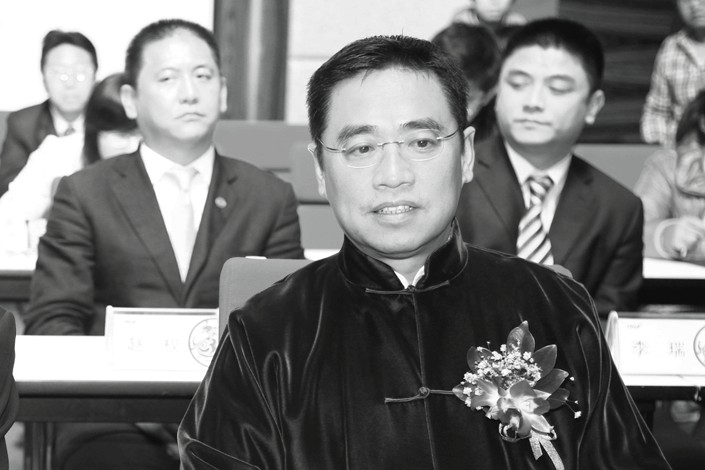HNA Chairman Dies After Fall in France

HNA Group, the former highflying Chinese conglomerate that has come under pressure for its heavy debt load, said on Wednesday that co-founder and Chairman Wang Jian, 57, accidentally fell and died from his injuries during a business trip in France.
The company said the death occurred on Tuesday, but didn’t provide further details. The company’s official website and internal websites became black and white, losing their usual color, in a sign of mourning often seen in China, according to one worker at an HNA office, speaking on condition of anonymity due to the situation’s sensitivity.
A source close to Wang told Caixin that he was visiting France on a business trip and took a break to visit Avignon in Provence, an area popular with tourists. He became unconsciousness after falling more than 10 meters (32.8 feet) off a wall. The source said that after regaining consciousness while he was being treated at hospital, the only thing Wang said was that his feet hurt.
HNA Chairman Chen Feng is on his way to France, and other executives have rushed back to the company’s headquarters in Haikou, Hainan province, Caixin has learned.
A friend of Wang’s who dined with him a month ago told Caixin that Wang explained to him during the meal that he had been having heart problems and that his blood pressure had been unstable. “Wang Jian had a hereditary heart disease, and he had undergone a heart surgery before,” the source told Caixin. “He had been under great pressure recently.”
French media reported that an unidentified aviation executive fell from a wall while taking pictures at a castle in the village of Bonnieux.
One of China’s most acquisitive companies, HNA has been under heavy financial and regulatory pressure since last year due to its heavy debt load. It is one of several Chinese conglomerates that embarked on major global buying sprees over the last decade, snapping up billions of dollars in domestic and overseas assets before coming under pressure from their heavy debt loads.
HNA was one of the earliest members of that expansionary group, making major purchases for much of the last decade. One of its earliest assets was Hainan Airlines Holding Co. Ltd., one of China’s oldest privately owned airlines, based on the southern tropical island of Hainan, which has become a major tourist destination. Many of the company’s earliest assets came from the travel and leisure sectors that were close to its roots.
Some of its largest purchases included its $6.5 billion acquisition of 25% of hotel giant Hilton Worldwide and its $6 billion purchase of U.S. computer parts distributor Ingram Micro, both in 2016. Its other aviation- and travel-related purchases included aviation services providers Swissport and Gategroup, and aircraft leasing company Avolon Aerospace.
But HNA and some of its peers began coming under pressure last year, as China moved to rein in risks to the financial system created by such debt-ridden companies, while cracking down on acquisitions in areas like travel, leisure and entertainment that were seen as frivolous. Others to get caught in the crackdown included energy conglomerate CEFC China Energy, insurance giant Anbang Insurance Group, and real estate and entertainment company Wanda Group. Many of the companies also came under scrutiny for their opaque ownership structures.
This year, HNA embarked on a major selling spree to pay down its debt, with sales including its Hilton stake purchased just two years earlier. Earlier this year, the company also took the unusual step of disclosing its shareholding structure, saying that Wang and co-founder Chen Feng each owned about 15% of the company.
Wang is just one of several high-profile heads of the big conglomerates to get caught up in Beijing’s efforts to tame the group. In May, former Anbang Chairman Wu Xiaohui was sentenced to 18 years in prison for fundraising fraud and embezzlement. And Caixin reported earlier this year that CEFC Chairman Ye Jianming had also come under investigation.
Contact reporter Yang Ge (geyang@caixin.com)
- 1China Officials Dismiss Tax Hike Rumors After Tech Selloff
- 2Cover Story: How Gutter Oil Became a Prized Fuel for International Airlines
- 3Prominent Chinese Journalist Liu Hu Detained by Police in Chengdu
- 4Maersk Unit Takes Over CK Hutchison Panama Ports After Court Ruling
- 5China Provinces Set Cautious 2026 Growth Targets
- 1Power To The People: Pintec Serves A Booming Consumer Class
- 2Largest hotel group in Europe accepts UnionPay
- 3UnionPay mobile QuickPass debuts in Hong Kong
- 4UnionPay International launches premium catering privilege U Dining Collection
- 5UnionPay International’s U Plan has covered over 1600 stores overseas




